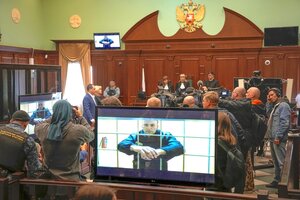Why Ukraine helps global causes for honest leaders
The country’s anti-graft successes may have helped trigger the Russian invasion. But the war now inspires calls for an international anti-corruption court.

Russian anti-corruption fighter Alexei Navalny appears on a video link from prison at a May 24 court hearing in Moscow.
AP
One plausible reason for Russia’s invasion of Ukraine is that Ukrainian citizens have made progress in creating transparent and accountable government. The Kremlin not only feared it could no longer use corrupt oligarchs to control the country but a less-corrupt Ukraine might inspire the Russian people to demand the same.
This war, said imprisoned Russian anti-corruption activist Alexei Navalny on the first day of the invasion, “was unleashed to cover up the theft from Russian citizens.”
The invasion, in other words, is an example of how much corruption across borders now influences global events. Last year, for example, corruption in the Afghanistan military led to the collapse of an elected government, forcing a hasty retreat of U.S. forces as the Taliban took over. Anti-corruption protests in Iran may affect talks to curb its nuclear weapons program. Corruption in a number of countries such as Sri Lanka has made it easier for China to gain access to foreign ports for its navy.
A year ago, U.S. President Joe Biden issued an order that the fight against corruption worldwide is a “core” national security interest. In April, the Netherlands, Canada, and other countries announced a plan to meet in a few months to curb graft that often leads to famine, human rights violations, and even war.
All of this has helped revive a decadelong campaign to set up an international anti-corruption court, one that would act only if a country fails badly in combating graft. On Tuesday, 42 former presidents and prime ministers added their support to the idea, according to two global nonprofits, Integrity Initiatives International and Club de Madrid.
Corruption “has global dimensions and cannot be combated by the affected countries alone,” said Danilo Turk, a former president of Slovenia. In recent years, many other world leaders as well as Nobel laureates have joined the cause.
Creating such a court is an uphill battle. It remains unclear how it would assert any authority or gain enough acceptance among countries to change international norms. It would be modeled after the International Criminal Court, which has a mixed record of success since its founding in 2002.
Still, the Ukraine war – with its probable origins in the country’s progress in good governance – has reenergized anti-corruption efforts in many countries. Ukraine’s efforts have indeed inspired others.

